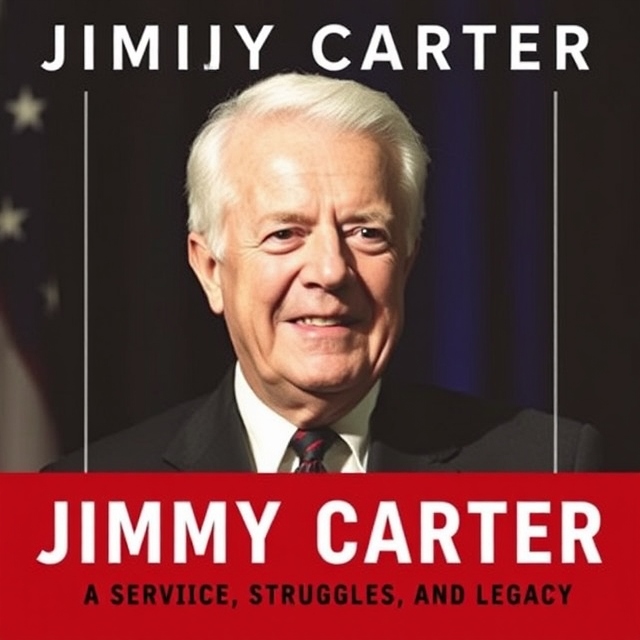Born on October 1, 1924, in Plains, Georgia, Jimmy Carter grew up in a farming family.
He served in the U.S. Navy and later entered politics, becoming the governor of Georgia in 1971. His time as governor was marked by his advocacy for civil rights and energy conservation.
Presidency (1977–1981)
Carter served as the 39th President of the United States, focusing on human rights, energy policies, and a peace-driven foreign policy. His most significant achievement during his presidency was the Camp David Accords, which led to a peace treaty between Egypt and Israel.
Post-Presidency Humanitarian Work
After leaving office, Carter continued to influence global affairs through his work with the Carter Center, which he founded in 1982. The center focuses on promoting peace, advancing democracy, and combating disease. Carter’s commitment to humanitarian causes earned him the Nobel Peace Prize in 2002.
Lasting Impact
Carter’s legacy is marked by his dedication to human rights and peace. Though his presidency faced challenges, his post-presidential efforts have solidified his place as a respected figure in both American politics and global humanitarian work. His commitment to service and kindness continues to inspire future generations.
Early Life and Background
Birth and Upbringing in Plains, Georgia
Jimmy Carter was born on October 1, 1924, in a small town called Plains in Georgia. He grew up in a humble farming family, and his parents, Earl and Lillian Carter, taught him important values such as the importance of hard work, respect for others, and helping those in need. These values had a lasting impact on him throughout his life and shaped his future work in both politics and humanitarian efforts.
Education and Early Career as a Naval Officer and Farmer
Carter attended the local public school in Plains and then went on to Georgia Southwestern College. Later, he earned a place at the prestigious U.S. Naval Academy in Annapolis, where he graduated in 1946. After completing his studies, Carter became a naval officer and served on submarines, an experience that helped him develop strong leadership skills and gave him a deeper understanding of teamwork and discipline.
After his time in the Navy, Carter returned to Georgia to manage the family’s peanut farm. This was an important period in his life, where he learned about agriculture, business, and the challenges faced by farmers. His experiences as a farmer not only shaped his work ethic but also influenced his later decisions as a politician, especially in terms of his environmental and economic policies.
Political Rise: From Governor to President
Entry into Georgia State Politics
Jimmy Carter’s political career began in Georgia when he decided to run for a seat on the local school board in 1962. His early work focused on advocating for improvements in education and addressing the needs of his community. This experience opened the door for him to enter Georgia state politics, and in 1966, he ran for and won a seat in the Georgia State Senate. His work as a state senator helped him build a reputation as someone willing to tackle tough issues and challenge the status quo.
Election as Governor of Georgia
In 1970, Carter ran for governor of Georgia. His campaign focused on reforming the state’s government, improving racial relations, and addressing the economic challenges faced by the people of Georgia. Carter’s promise to end corruption and bring a fresh approach to politics resonated with voters, and he won the election. As governor, Carter worked on reducing government waste, improving education, and pushing for civil rights reforms. His time as governor helped establish him as a forward-thinking leader, which laid the groundwork for his presidential aspirations.
Presidential Campaign and Election in 1976
In 1976, Carter decided to run for president, entering a race against the incumbent, Gerald Ford. His campaign focused on themes of honesty, transparency, and restoring faith in the American political system after the Watergate scandal. Carter’s outsider status, along with his commitment to human rights and integrity, appealed to many voters. He won the election, becoming the 39th President of the United States. Carter’s victory marked the beginning of a new chapter in his political journey, as he worked to address both domestic and international challenges during his presidency.
Presidency: Achievements and Challenges
Domestic Policies: Energy Reforms, Environmental Initiatives, and Economic Challenges
During his presidency, Jimmy Carter focused heavily on domestic issues, particularly energy conservation and environmental protection. Facing an energy crisis, he introduced policies to reduce the country’s dependence on foreign oil, such as the establishment of the Department of Energy and the promotion of alternative energy sources like solar power. He also pushed for energy conservation through measures like fuel efficiency standards for cars and incentives for renewable energy technologies.
Carter was also a strong advocate for environmental protection, implementing legislation to strengthen air and water quality standards. However, his efforts to address the economy faced significant challenges, including high inflation, unemployment, and an energy crisis. Despite his initiatives, the U.S. economy struggled during much of his term, and he faced criticism for his handling of the nation’s economic difficulties.
Foreign Policies: Camp David Accords, Panama Canal Treaties, and Human Rights Advocacy
Carter’s foreign policy achievements were highlighted by the Camp David Accords in 1978, where he brokered a peace agreement between Egypt and Israel. This historic agreement ended decades of hostility and set the stage for broader Middle East peace efforts. Carter’s leadership in securing the accords earned him praise as a peacemaker.
Another major achievement in foreign policy was the signing of the Panama Canal Treaties in 1977, which transferred control of the Panama Canal from the United States to Panama by 1999. This agreement improved relations with Latin America and was seen as a symbol of Carter’s commitment to fairness and diplomacy.
Carter’s presidency also emphasized human rights, with a foreign policy approach focused on promoting democracy and standing against human rights abuses worldwide. His efforts to advance human rights, while admirable, were sometimes criticized for being inconsistent, especially when balancing relations with authoritarian regimes for strategic reasons.
Overall, Carter’s presidency was marked by significant achievements in peace and diplomacy, but also faced many challenges, particularly in domestic economic issues. Despite this, his focus on human rights and his diplomatic successes continue to define his legacy.
Post-Presidency: Humanitarian Work and Global Impact
Founding of The Carter Center
After leaving office, Jimmy Carter dedicated himself to humanitarian work by founding The Carter Center in 1982. The center’s mission was to promote peace, advance democracy, and improve global health. Through the Carter Center, Carter worked to eradicate diseases like Guinea worm disease, which has seen dramatic reductions in cases worldwide due to the center’s efforts. The center also focuses on election monitoring, human rights advocacy, and public health initiatives, making a significant impact in countries across Africa, Asia, and Latin America.
Nobel Peace Prize in 2002 for Efforts in Conflict Resolution and Human Rights
In 2002, Carter was awarded the Nobel Peace Prize in recognition of his lifelong efforts to promote peace, human rights, and democracy. The Nobel Committee highlighted his work in mediating conflicts, advocating for human rights, and advancing global health initiatives through The Carter Center. The award solidified his legacy as a key figure in global humanitarian efforts and peacebuilding, further cementing his reputation as one of the world’s leading advocates for justice and compassion.
Ongoing Health Challenges and Public Appearances
In recent years, Carter has faced health challenges, including a diagnosis of cancer and brain surgery. Despite these health issues, he has remained active in public life, continuing to travel, give speeches, and support various charitable causes. His resilience and commitment to serving others, even in his later years, have inspired millions around the world. Carter’s enduring presence in the public eye, combined with his humanitarian efforts, continues to make a lasting impact long after his time in office.
Recent Developments: Passing and Funeral
Passing of Jimmy Carter
On December 29, 2024, former U.S. President Jimmy Carter passed away at the age of 100, surrounded by family at his home in Plains, Georgia. Known for his remarkable presidency and later life of humanitarian work, Carter’s death marked the end of a century-long life dedicated to service, peace, and human rights. He had been in hospice care for several months prior to his passing, with his family by his side as he peacefully concluded his journey. Throughout his life, Carter earned respect for his efforts to promote peace, global health, and democratic values, making his passing a moment of reflection for both the nation and the world.
Funeral Arrangements and Services
In honor of his extraordinary contributions, a state funeral was held for Jimmy Carter at the Washington National Cathedral on January 9, 2025. The service was a solemn and heartfelt occasion, reflecting the profound respect Carter garnered over the years. The cathedral, a symbol of national unity, provided the perfect setting for the tribute to a man whose life embodied service, dedication, and compassion. During the ceremony, dignitaries, family members, and close friends gathered to celebrate his legacy and reflect on his significant achievements in both the political and humanitarian spheres. The service included speeches and eulogies from prominent figures who spoke of Carter’s integrity, dedication to human rights, and his efforts to bring peace to troubled regions of the world.
Attendance of Dignitaries
The funeral brought together a host of dignitaries, including all five living U.S. presidents: current President Joe Biden, along with former Presidents Donald Trump, Barack Obama, George W. Bush, and Bill Clinton. Their attendance at the funeral was a powerful symbol of the respect and admiration Carter commanded across political lines. In addition to the U.S. presidents, international figures such as Prince Edward of the United Kingdom and Canadian Prime Minister Justin Trudeau also attended, acknowledging Carter’s global impact. The ceremony highlighted Carter’s importance not only to American history but to the world, especially in his commitment to peace and human rights.
During the service, President Biden delivered an emotional eulogy, recalling Carter’s legacy as a leader of integrity, one who consistently sought to treat others with dignity and respect. Other speakers included Carter’s grandson, Jason Carter, who shared personal memories of his grandfather, and several notable figures, such as Bill Gates and Bernice King, who spoke about Carter’s lifelong work with The Carter Center in promoting global health, eradicating diseases, and advancing democracy.
Final Resting Place
Following the funeral in Washington, Carter’s body was flown to Plains, Georgia, where he was laid to rest beside his wife, Rosalynn, at a private burial service. The peaceful town where Carter was born, raised, and spent much of his life was the perfect final resting place for a man whose life had been devoted to his community and to bettering the world. In his final moments, surrounded by his loved ones and the community that had supported him throughout his journey, Carter was honored not just as a former president, but as a beacon of hope and compassion whose legacy would continue to inspire future generations.
Public and Global Reactions
Tributes from Political Leaders, Organizations, and Citizens Worldwide
The passing of Jimmy Carter on December 29, 2024, was met with an outpouring of tributes from political leaders, organizations, and citizens around the world. Leaders from both sides of the political spectrum in the United States praised Carter for his integrity, commitment to peace, and dedication to improving the lives of the less fortunate. Current President Joe Biden described Carter as “a man who always put others first,” highlighting his lifelong commitment to humanitarian work. Former Presidents Barack Obama and George W. Bush also shared heartfelt messages, acknowledging Carter’s dedication to global peace and his role in shaping the modern world.
International leaders also expressed deep sorrow at his passing. Canadian Prime Minister Justin Trudeau spoke of Carter’s enduring legacy in promoting human rights and democracy, while former UK Prime Minister Tony Blair praised his work on the Camp David Accords and his commitment to conflict resolution. The United Nations, where Carter had long advocated for human rights, issued a statement mourning the loss of a “global champion of peace and justice.”
Non-governmental organizations and global institutions like the Carter Center also paid tribute to Carter, emphasizing his immense contributions to global health, democracy, and peace. The Carter Center, under his leadership, helped eradicate diseases like Guinea worm disease and supported free and fair elections in various parts of the world. The global community recognized his role as a tireless advocate for the most vulnerable populations.
Media Coverage and Public Mourning
Media outlets worldwide provided extensive coverage of Carter’s passing, his life’s achievements, and the impact he made on global peace, health, and human rights. News stations aired tributes and documentaries recounting his presidency, his post-presidential humanitarian work, and his personal character, with commentators praising his ability to bridge divides and focus on the greater good.
Public mourning was widespread, with citizens in the United States and across the globe expressing their sorrow and gratitude for Carter’s work. Memorials and gatherings took place in various cities, where people came together to celebrate his legacy. Social media platforms became a space for people to share personal stories, quotes, and reflections on how Carter had influenced their lives.
In Plains, Georgia, where Carter had lived his entire life, local residents held vigils and paid their respects at his childhood home and church, remembering the man who had always stayed connected to his roots, even while serving as president. The sense of loss was palpable, but so was the recognition of the lasting impact he had made, not only on the U.S. but on the world stage. Through these tributes and collective mourning, it was clear that Jimmy Carter’s legacy would endure for generations to come.
Conclusion: Reflecting on a Life Well-Lived
Enduring Legacy in Politics, Humanitarian Work, and Global Peace Efforts
Jimmy Carter’s life and work serve as a testament to the power of integrity, compassion, and commitment to service. His presidency, though marked by significant challenges, left a lasting imprint on both U.S. domestic policies and global affairs. His focus on human rights, environmental reform, and energy conservation set him apart as a visionary leader. However, it was his post-presidency efforts that truly solidified his legacy as one of the world’s greatest humanitarians. Through The Carter Center, Carter worked tirelessly to improve global health, reduce poverty, and promote democracy, leaving behind a legacy of peace, advocacy, and healing. His efforts to mediate conflicts, most notably the Camp David Accords, helped reshape the Middle East and furthered his reputation as a global peacekeeper.
Final Thoughts on His Contributions and Impact on Future Generations
Jimmy Carter’s contributions extended far beyond his time in office. His commitment to the betterment of humanity, long after his presidency, is a defining aspect of his life. The work he did with The Carter Center continues to affect millions around the world, particularly in areas where disease, hunger, and conflict still pose significant challenges. Carter’s humility, personal integrity, and unwavering dedication to making the world a better place will inspire future generations of leaders and citizens alike. He proved that true leadership lies not in the accumulation of power but in the selfless pursuit of peace, justice, and equality.
As we reflect on his life, we are reminded that the most profound legacies are not always measured by titles or political victories, but by the positive, lasting impact one has on the lives of others. Jimmy Carter’s life serves as a beacon of hope and an example of how dedication to the greater good can transcend time, making him a figure whose influence will continue to resonate for many years to come.








